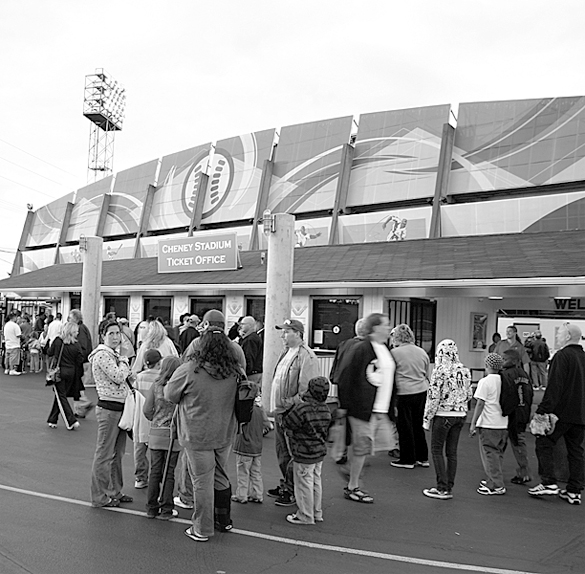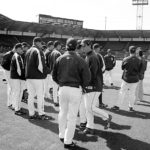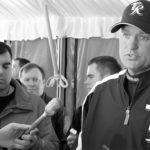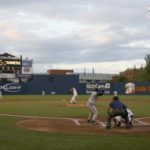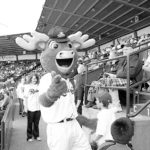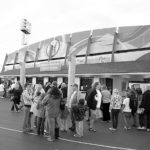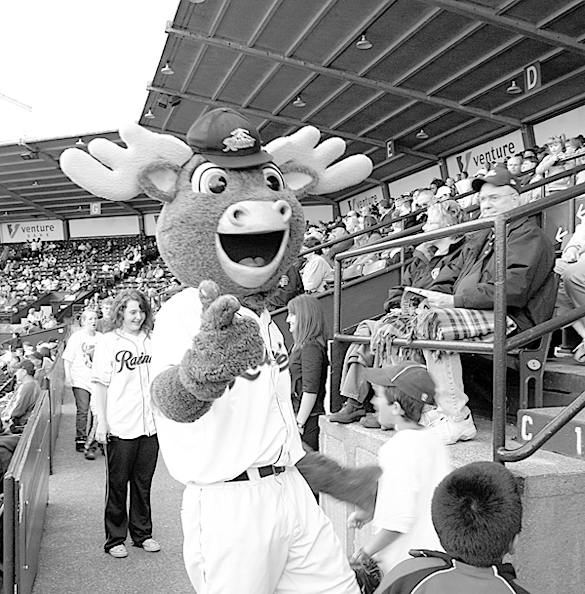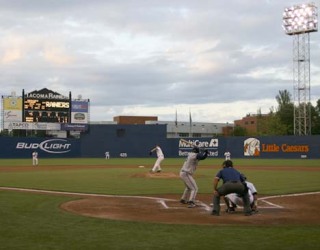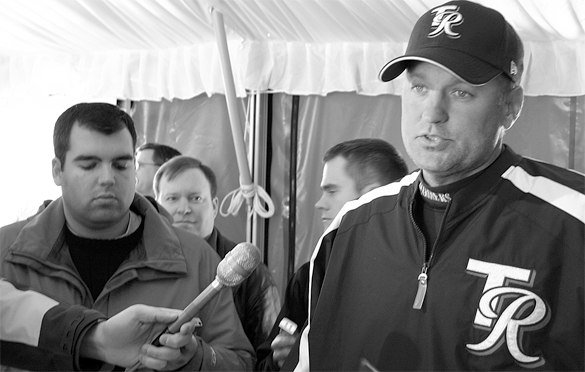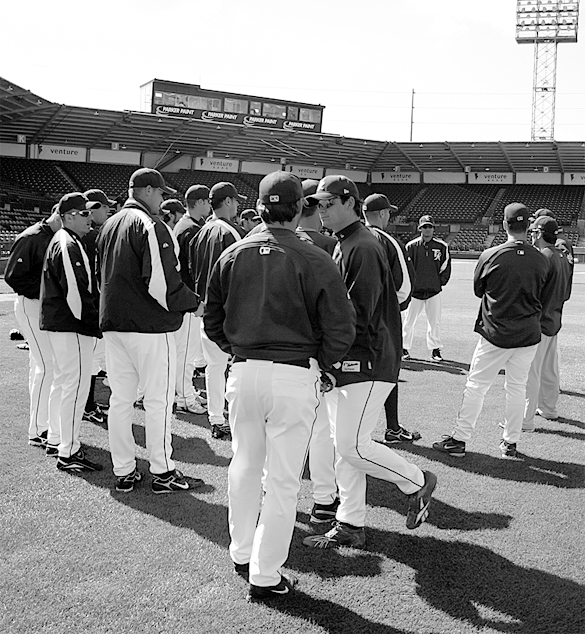If front office executives for the Triple-A Tacoma Rainiers baseball team wanted a tally of its loyal fan base, it would have been well-served during a Saturday evening game last April. A freak cold-front chilled the Puget Sound region, and plunging temperatures put the freeze on any outside activities. At Cheney Stadium, the Rainiers’ home field, you had to be either crazy or die-hard fanatic (or both) to turn out for the first pitch, where the temperature an hour before game time was 38 degrees Fahrenheit.
But there they were, bundled in fleece blankets, and sporting wool sweaters and stocking caps emblazoned with the team’s logo — several hundred fans lined up outside the gates to Cheney Stadium and waiting for ushers to let them inside. On the field, players for both teams — the Tacoma Rainiers and the Colorado City Sky Sox (the Colorado Rockies’ Triple-A affiliate) — poked their heads out of their respective dugouts, like groundhogs tentatively gauging the weather. A few ventured out to run laps in the outfield, or toss balls back and forth, before a slushy mixture of snow and rain sent them racing back to their clubhouses.
“Wow, this is really weird weather,” said game entertainment manager Danah Wietry, watching from the grass behind home plate as snowflakes slowly drifted down onto the pitcher’s mound. Wietry, a thin, blonde twenty-something with boundless energy, is responsible for pre-game and entertainment between innings. On this evening, Wietry was on a walkie-talkie with executives in the press box, waiting to learn if the game would be played, delayed, or canceled.
In the end, the game was delayed. When the announcer welcomed visitors to Cheney Stadium, and the grounds crew pulled back the infield tarp, 3,149 Rainiers’ fan faithfuls hadn’t budged. They were ready for the first pitch, even if it was 35 minutes late.
A minor-league baseball fan is a special person - someone who shows up in the freezing cold to catch a game, for instance. It’s an even rarer person in the Puget Sound region, where most baseball fans prefer watching the major league Seattle Mariners over the Pacific Coast League Tacoma Rainiers, the Mariners’ minor league affiliate. But if you are a baseball purist who enjoys watching athletes play the game well (athletes arguably more competitive and hungrier for their big league breaks), and in a smaller setting at a much cheaper price, then put one of the Rainiers’ 72 home games on your calendar. Throw in a summer afternoon with clear skies and warm temperatures, and the experience can be unforgettable.
“The biggest differences between major league and minor league baseball are the prices and the sheer scope of things,” says Tacoma resident Justin Carleton, who runs ‘No Rhubarb!’ — the only fan blog devoted to the team. “If you are going to a Rainiers game, you are going to park for five dollars. To get the same parking lot in downtown Seattle, near Safeco Field, it’s going to be 40 dollars. Going to a Rainiers game is smaller, it’s more intimate, and there are going to be fewer fans. You may very well meet a member of the team. Something I always notice is the difference in billboards. Go to Safeco Field, and it’s Starbucks, Boeing, and Microsoft. Go to a minor league park, and it’s the guy whose tire shop is down the street.”
For Schlegel Sports, the Dallas, Tex.-based sports management team that purchased the Rainiers in 2006 and wrapped up its second complete season of ownership this week, weather-related fan turnout is low on its list of challenges.
There’s also the issue of re-introducing a baseball team to the South Sound after previous owners had become largely absent. There’s Cheney Stadium, too, an aging, 48-year-old ballpark that no amount of fresh paint can spruce up. And the Seattle-Tacoma sports market isn’t like, say, Albuquerque (home of the Isotopes), Toledo (home of the Mud Hens), or Tucson (home of the Sidewinders) — all small towns or cities where minor league baseball is an easy sell because it is the only game in town.
Still, there’s money to be made in minor league baseball. In 2004, nearly 40 million people attended a minor league baseball game in the United States, where 178 teams are scattered throughout 15 leagues. The Sacramento River Cats and the Memphis Redbirds sell nearly 1 million tickets per season. In Tacoma, 313,031 fans purchased tickets in 2006; the number increased to 345,538 in 2007. On opening day this year, team officials said they expected to grow that number by 10 percent this season. And the new ownership has thrown its weight behind its acquisition by hiring front-office staff and aggressively marketing to South Sound residents and businesses.
“I like them,” says fan and blogger Carleton. “While it’s always nice to have local ownership, Schlegel took over a franchise that was in trouble. The previous ownership group, which was a local owner, their idea of marketing was putting a sign up that said, ‘There’s baseball tonight,’ and that was about it. The Schlegel guys came in and didn’t have a whole lot to work with, but they did pretty well.”
TACOMA’S MINOR LEAGUE BASEBALL TRADITION
Though professional baseball in Tacoma dates back to the early-1900s, its modern-day incarnation with Pacific Coast League affiliation dates back to 1960, when Cheney Stadium was built and the Phoenix Giants moved to town. Six year later, the Chicago Cubs purchased the team and renamed it the Tacoma Cubs.
In 1972, however, ownership became local.
Tacoma businessmen Stan Naccarato and Clay Huntington purchased the team, and changes in affiliation (Minnesota, New York, Cleveland, and Oakland) and team names (Tacoma Twins, Tacoma Yankees, Tacoma Tugs, and Tacoma Tigers, respectively) followed. In 1991, George Foster bought the Rainiers for $5.5 million, switched its affiliation to the Seattle Mariners, and ran it for nearly a decade before putting it up for sale in 2000. Except for a proposed $11 million deal that fell through in 2003, the team sat on the market with little interest from prospective buyers, and less enthusiasm from existing ownership and fans.
Enter Schlegel Sports. The Texas company already had two minor league hockey teams in its portfolio, and was looking for an inroad to minor league baseball. In early-2006, Schlegel executives contacted Foster, and later flew to Tacoma to attend a few games and visit the city. By summer, Foster announced it was close to a deal to sell the team. A month later, Kirby Schlegel and his father, Robert, arrived in Tacoma. Unexpectedly, they brought along pop singer Nick Lachey for a press conference at the Greater Tacoma Convention and Trade Center downtown to announce the three would purchase the team (the team declined to share the sale price, as well as the its annual revenues and expenses).
“We saw, operationally, things we could do to fix it up and increase revenue,” says Kirby Schlegel, who recalls the purchase during a recent phone interview. “We focused on season tickets, sponsorship, and just getting attendance up. And then we really wanted to bring in the business community, and use things like the Gold Club and create some of those all-inclusive packages that really give a business networking standpoint for local companies.”
Though Lachey raised the eyebrows of die-hard baseball fans, Schlegel assured gathered media that his company was serious. “He’s a huge baseball fan,” says Kirby, who notes that last year, Lachey was in Tacoma to host a celebrity baseball game and throw out the first pitch, and will be in Tacoma Sept. 21 for a celebrity softball tournament. “Nick’s really enjoying it. The part he really enjoys is getting up there to Tacoma and going to games every once in awhile.”
Once the team changed owners, Schlegel wasted no time in getting to work. He released manager Dave Brundage and hired Daren Brown, a veteran baseball player whose southern twang imparts old-school baseball wisdom during press conferences. His father was a pitcher for the Philadelphia Phillies, and Brown himself pitched for the Toronto Blue Jays.
Schlegel also released long-time general manager Dave Lewis and hired 34-year-old Aaron Artman as team president. Artman was on hiatus from sports management after a six-year stint as an executive at Mandalay Baseball Properties (owner of five minor league franchises) to work for Microsoft Corp., but was itching to return to the industry.
Schlegel also increased the front-office staff from 12 full-time employees to 30, hiring directors of customer service, game operations, and game entertainment, as well as nine full-time ticket salespeople who blanket downtown Tacoma, Olympia, Gig Harbor, Puyallup, and even South King County.
Last year, the team focused most of its energy on marketing to South Sound businesses. “We found, right when we got here, there were a ton of businesses down here that wanted to do business entertainment, and didn’t want to drive all the way to Seattle to do it,” says Artman.
In 2007, the team introduced its Gold Club membership in hopes of appealing to business owners who wanted to treat employees or key clients to baseball games throughout the season. The package includes unlimited beer, wine, soft drinks, and food from a private club and concessionaire, front row seats, and VIP parking. It was a smart move: the team sold approximately 500 of the $1,500 memberships, and increased that number to approximately 1,200 this season. In February of this year, it landed a five-year deal with Venture Bank to rename its popular Gold Club after the bank, and to make Venture Bank the ball club’s official bank. This season, the Rainiers opened a second Gold Club, located along the right field line. Also in 2007, it introduced party decks along the left field line for groups of 50 to 100 people.
In a seemingly counterintuitive move, last off-season the team pared down the number of its total sponsors from 34 to 20. Brian Simpson, Vice President of Corporate Sponsorships, says the move was meant to give sponsors more dominance and exclusivity on the outfield wall, as well as in its free program — The Dirt. Whereas last season, the outfield wall and scoreboard looked more like a NASCAR driver’s uniform, with every available square inch covered in logos, this year’s outfield wall is cleaner. Though sponsors pay a little more to advertise, there’s only one major sponsor in any given industry sector. For example, Budweiser doesn’t compete with, say, Coors, and Little Caesars Pizza doesn’t compete with, say, Pizza Hut.
WHAT TO DO WITH ‘HISTORIC’ CHENEY STADIUM?
No matter how hard the front office works on improving the fan experience, however, one obstacle remains: Cheney Stadium. The 7,500-seat, city-owned stadium was built in 1960 in 100 days, and sits in the parking lot of Foss High School. Not much about the stadium has changed. The press box is a run-down affair: accessible via old, rusty staircase, the entire structure shakes whenever someone crosses a catwalk that leads inside. The concourse is a ring of concrete that couldn’t be more removed from on-field action; unlike Safeco Field, there are no closed-circuit television screens to watch the action, or radio broadcasts to listen to while waiting in line for a beer or hot dog. A scoreboard in centerfield lacks the giant video screens popular at other sports venues. And though executives like to call it “historic,” it seems more a euphemism for “outdated.”
And the stadium exists at a time when other minor league ballparks have followed the trend of major league teams: building new ballparks with ample concessions, multiple points of sales, and amenities that enhance a fan’s experience. That’s what happened in Oklahoma City, Oklahoma ($35 million, 13,000-capacity AT&T Bricktown Ballpark); Allentown, Pennsylvania ($34 million, 7,000-capacity Coca-Cola Park); Fresno, California ($46 million, 12,500-capacity Chukchansi Park); and Reno, Nevada (an $81 million, 10,000-capacity stadium currently under construction; the Tucson Sidewinders will be relocated there and renamed in 2009).
The team doesn’t plan to move anytime soon. According to the team, it recently renewed its lease with the City through 2015. A new stadium could cost at least $30 million. Considering the history of sports-arena funding debacles in the Puget Sound region (see Safeco Field, Qwest Field, and Key Arena), it’s not likely either the Rainiers or the City of Tacoma will make a plea to taxpayers for a new stadium. Last year, the Legislature allocated $2.5 million for minor stadium improvements, but it doesn’t resolve the fact that Cheney Stadium is still a 48-year-old baseball stadium located in a high school parking lot.
“From a business perspective, there are some challenges,” admits team president Artman. “It would be great to have suites or something like that. There’s a demand for that in the South Sound, and people have asked for it. We would love to have a video board to entertain the fans. It’s a challenge. It’s limited in the number of restrooms. It’s limited in the number of points-of-sale you have for concessions. So when you do work your tail off to get a great crowd out here, and the team becomes more popular, there are some setbacks. But it is what it is.
Artman says the team is currently working with a number of elected officials to find a solution. One coalition - the Joint Municipal Action Committee, which includes representatives from the City, Pierce County, Tacoma Public Schools, and Metro Parks is looking into a plan to rehab the entire 111-acre site that includes Cheney Stadium. Earlier this year, JMAC hired Tacoma design firm BCRA to explore their options. In July, BCRA presented its initial recommendations to JMAC and Tacoma City Council; the plan, based on feedback collected from various stakeholders, included more public green-space and the creation of an urban village of mixed-use residential and retail space. But there’s more work to be done, and it’s unclear how any renovation would be funded.
“[We’re trying] to figure out how we can do a major renovation to Cheney Stadium, but also keep some of the aspects of it, which are just great,” says Artman, who would like to see the field preserved, the stadium torn down, and a new stadium built. “Basically give it a modern-day feel — rebuild the concourse, add in suites, re-do the outfield wall. That kind of stuff. We’re in pretty serious discussions right now, trying to figure that out.”
“It does present challenges,” adds Schlegel, referring to the stadium’s age and condition. “We don’t have a video board. We don’t have suites. We don’t have a lot of the items most Triple-A ballparks have. We are working toward all of those. We’ve had good meetings with the people up there to really try to pull together the right amount of dollars to do a renovation of the stadium.”
There’s also the issue of marketing the team in the shadow of the Mariners, which holds the contracts for the players and pays their salaries. Unless you are a die-hard Rainiers fan, you probably won’t be too familiar with the minor league line-ups. Sure, stars like Mark McGwire, Alex Rodriguez, and Felix Hernandez have donned Rainier jerseys early in their careers. But an undeniable aspect of minor league baseball is that the team is beholden to its major league affiliate. Don’t get too excited if the Rainiers are on a winning streak or leading their division. If the Rainiers are doing well, and the Mariners aren’t, you can probably count on the major league team to raid its minor league roster and call those key players up.
So it begs the question: What’s the point of seeing and following minor league baseball?
For team president Artman, who doesn’t see a marketing rivalry between the ball clubs, it’s all about selling an experience — decent baseball and reasonable ticket prices in a small setting that places fans close to the action — that only minor league baseball provides.
“It’s funny because I’ve been with teams that have won titles in the minor leagues, and I’ve been with teams that had the worst record in the league,” he says. “Attendance doesn’t really change either way. It’s more about the experience. So you don’t worry as much about whether a player is going to get called up or whether the team is going to go on a losing streak — which, of course, we want to win like everyone else does — but people come out here more for the experience, and to have a good time.
“We know our fans go to Mariners games, and God bless them, they should,” adds Artman. “The Mariners offer an awesome experience, and Safeco is great. That said, there are enough people in the South Sound to come to our games and have a good time. We try to make sure we create one of the best experiences anywhere for any sport. I don’t think there’s anything better than coming out to a minor league baseball game.”
Todd Matthews is editor of the Tacoma Daily Index and recipient of an award for Outstanding Achievement in Media from the Washington State Department of Archaeology and Historic Preservation for his work covering historic preservation in Tacoma and Pierce County. He has earned four awards from the Society of Professional Journalists, including third-place honors for his feature article about the University of Washington’s Innocence Project; first-place honors for his feature article about Seattle’s bike messengers; third-place honors for his feature interview with Prison Legal News founder Paul Wright; and second-place honors for his feature article about whistle-blowers in Washington State. His work has also appeared in All About Jazz, City Arts Tacoma, Earshot Jazz, Homeland Security Today, Jazz Steps, Journal of the San Juans, Lynnwood-Mountlake Terrace Enterprise, Prison Legal News, Rain Taxi, Real Change, Seattle Business Monthly, Seattle magazine, Tablet, Washington CEO, Washington Law & Politics, and Washington Free Press. He is a graduate of the University of Washington and holds a bachelor’s degree in communications. His journalism is collected online at wahmee.com.
